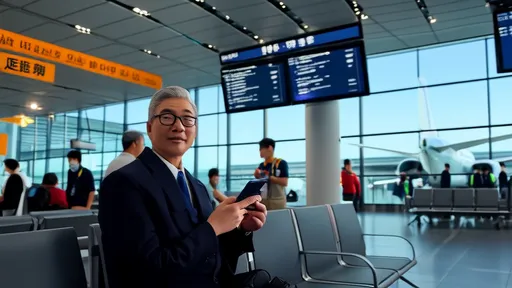There is perhaps nothing more universally frustrating in modern travel than the dreaded flight delay. What begins as a day filled with anticipation and plans can quickly devolve into a stressful test of patience, often leaving passengers feeling powerless and adrift in a sea of airport announcements and conflicting information. Yet, the experience of a delayed or canceled flight, while undoubtedly inconvenient, does not have to be a complete loss. A growing body of passenger rights, both enshrined in law and embedded in airline policies, provides a framework of protection. The key for any traveler is to move from a state of passive waiting to one of empowered action, transforming a period of stagnation into an opportunity to assert one's rights and mitigate the disruption.
The foundation of passenger empowerment begins long before wheels are ever scheduled to up. It is laid during the booking process itself. Savvy travelers understand that not all tickets are created equal. The choice of airline, fare class, and even the method of payment can significantly alter the landscape of compensation and rebooking options should things go awry. Many credit cards, particularly those marketed towards frequent travelers, offer robust trip delay and cancellation insurance as a standard perk, but these benefits are only activated if the flight was purchased with that specific card. This simple act can be the difference between sleeping on an airport bench and having a covered hotel stay. Furthermore, a basic understanding of an airline's contract of carriage—the legal fine print everyone agrees to but few read—can reveal crucial policies on meal vouchers, hotel accommodations, and rebooking priorities that are not always volunteered at the gate.
When the announcement finally crackles through the terminal, confirming a significant delay or cancellation, the initial reaction is critical. The first and most important step is to verify the cause of the disruption. This single piece of information is the linchpin upon which all passenger rights hinge. Broadly, causes are categorized as within the airline's control (e.g., mechanical issues, crew scheduling problems) or outside of its control (e.g., severe weather, air traffic control delays, security incidents). In regions with strong passenger rights frameworks, like the European Union, compensation is heavily dependent on this distinction. A delay caused by a technical fault with the aircraft will likely entitle passengers to financial compensation, while one stemming from a thunderstorm will not.
Armed with an understanding of the cause, the proactive passenger springs into a multi-front effort. Physically, they should immediately join the line at the customer service desk; the early bird often gets the last seat on the next available flight. Digitally, and simultaneously, they should be on their phone. Opening the airline's own app can sometimes allow for faster rebooking than waiting in a long queue. A call to the airline's customer service line, while often plagued by long hold times, represents another channel to explore. It is not uncommon for phone agents to have access to different inventory than gate agents. While managing these logistical efforts, passengers should also begin documenting everything. This includes taking screenshots of the original flight status, the new revised status, and all official communications from the airline. Keeping every receipt for any incurred expenses, from a bottle of water to a taxi ride, is essential for any future reimbursement claim.
For travelers on routes within or departing from the European Union, the EC 261 regulation represents a powerful bill of rights. It mandates fixed levels of financial compensation for passengers facing long delays or cancellations, provided the cause was within the airline's control. The amounts can be substantial, often reaching 600 euros, and apply even if the passenger is eventually rerouted to their final destination. The process for claiming this compensation is straightforward, typically initiated through a form on the airline's website. Many carriers, anticipating these claims, have streamlined the process, though some may require persistent follow-up. For those less inclined to navigate bureaucracy, a entire industry of claim recovery firms has emerged, who will pursue the claim on a passenger's behalf in exchange for a percentage of the recovered funds.
In the United States, the regulatory environment is different, focusing less on mandatory monetary compensation and more on requiring airlines to adhere to their own stated policies. The Department of Transportation mandates that airlines provide timely updates, promptly refund tickets for canceled flights if the passenger chooses not to travel, and, crucially, return passengers to their original fare basis if rebooking is necessary. This prevents airlines from charging a higher fare for a last-minute ticket on a alternative flight. The recent push for a passenger bill of rights in the U.S. has further emphasized the requirement for airlines to develop clear and consistent policies regarding amenities like meals, lodging, and rebooking in the event of controllable delays.
Beyond the immediate scramble for a new flight, the aftermath of a delay is a period for methodical follow-up. If expenses were incurred that the airline is responsible for covering—such as a hotel room or meals during an overnight delay—a formal claim must be submitted with all accompanying receipts. This is where the earlier documentation proves invaluable. For compensation under regulations like EC 261, the formal claim process begins. It is also a moment to leverage other resources. Travel insurance policies should be notified, and credit card companies contacted to trigger their built-in protection benefits. A polite but firm follow-up email or letter to the airline's corporate customer care department can often yield results, such as travel vouchers or miles, even in situations where legal compensation is not required, as a gesture of goodwill for the inconvenience suffered.
The culture of air travel is slowly shifting from one where delays were an accepted, if miserable, part of the journey to one where passengers are increasingly aware of their agency. Knowledge is the most valuable currency in the airport during a crisis. Understanding the reason for the delay, knowing the specific rights afforded by the operating airline and the governing jurisdiction, and executing a calm, multi-pronged response strategy can dramatically alter the outcome. It transforms a scenario of helpless frustration into a manageable, and sometimes even compensable, logistical challenge. The next time the departure board flashes red, the prepared traveler sees not just a problem, but a process—and an opportunity to ensure they are made whole.

By /Aug 22, 2025

By /Aug 22, 2025

By /Aug 22, 2025

By /Aug 22, 2025

By /Aug 22, 2025

By /Aug 22, 2025

By /Aug 22, 2025

By /Aug 22, 2025

By /Aug 22, 2025

By /Aug 22, 2025

By /Aug 22, 2025

By /Aug 22, 2025

By /Aug 22, 2025

By /Aug 22, 2025

By /Aug 22, 2025

By /Aug 22, 2025

By /Aug 22, 2025

By /Aug 22, 2025

By /Aug 22, 2025

By /Aug 22, 2025